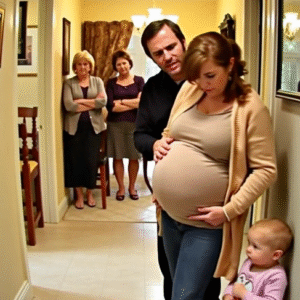The Sentence That Cut Through Silence
The cemetery was a field of stone and winter light. Four months had passed since the funeral, yet the ache in Daniel’s chest still felt like fresh ice—sharp, blinding, unforgiving. He stood at his son Arlo’s grave, tracing the oval portrait on the headstone with a thumb that trembled despite the calm February air.
“Yesterday this boy played marbles with me.”
The voice was small, bright, and impossibly certain. Daniel turned. A boy of about eight stood behind him—freckled cheeks, wind-pink ears, a drawstring pouch clutched in one hand.
Daniel’s face hardened. “What did you say?”
The child pointed—straight at Arlo’s photograph. “Him. Yesterday. We played marbles.”
A Father’s Anger Meets a Child’s Calm
“This is my son’s grave,” Daniel said, struggling to keep his voice even. “He died four months ago.”
The boy swallowed, unafraid but careful. “I know. I’m sorry, sir. But I have a message for you.”
“Where are your parents?” Daniel asked, the old heat of helplessness rising. “You can’t—this isn’t a place for games.”
“I’m not playing,” the boy replied. “Please… come with me. He’s just over there. A hundred meters. I can show you.”
Every instinct told Daniel to send the child away. But grief had taught him that certainty is not the same as truth—and that sometimes the smallest door opens into the largest room. He nodded once. “Lead the way.”
The Walk Between Worlds
They crossed the gravel path toward the chapel garden, where a low brick wall curved around a stand of birch. The boy’s pouch clicked softly against his leg—glass against glass, like a pocket full of colored raindrops.
As they turned the corner, Daniel saw a woman on a bench, watching a second child kneeling on the flagstones. The kneeling boy, slightly older, rolled marbles across the stone surface with careful concentration. A pale arc, a soft tap, a delighted intake of breath.
The woman stood as they approached. Her hands clasped and unclasped, searching for courage.
“Are you Mr. Hale?” she asked.
Daniel blinked. “Yes.”
She exhaled, relieved and undone in the same motion. “I’m Nora Bennett. This is my son, Micah.” She nodded toward the kneeling boy with the careful hands. “And this”—she smoothed the freckled child’s hair—“is his brother, Theo. We… hoped you might come.”
The Boy With the Scar and the Bag of Marbles
Up close, Daniel noticed the faint, recent curve of a surgical scar peeking above Micah’s shirt collar, a thin pink line that rose and fell with each breath. Beside him lay a folded sweater and the open pouch of marbles—greens like sea glass, blues like bottled sky, one golden cat’s eye shining like a captured sun.
Theo spoke before anyone could marshal the right words. “Yesterday, at the hospital playroom, Micah taught me how to line them up so they don’t roll away. He said a boy in a picture used to do it just like that. And when we came here today, I saw the same face.”
He pointed back toward Arlo’s headstone.
Daniel’s knees softened. “I… I don’t understand.”
The Truth That Took Four Months to Reach a Father
Nora stepped closer, voice low, steady. “Mr. Hale, four months ago, we got the call every parent prays for and dreads in equal measure. Micah’s heart was failing. We were out of options. And then—there was a donor. A perfect match. The surgery was the next morning.”
She paused, choosing each word as if it might break. “We don’t get names. We’re not supposed to. But the hospital keeps a quiet memorial in the chapel—a wall with first names only, dates, and a small photo if the family allows one. We come here every month to leave flowers. Yesterday, a new portrait was placed.” She swallowed. “Arlo.”
Silence gathered, soft and enormous.
“My son is alive today,” she continued, “because your son was the kind of boy who signed a donor card and told his family what he wanted to do with his one wild kindness. We didn’t know how to reach you. We just… hoped.”
Daniel stared at Micah—the careful hands, the concentrated joy, the way his small chest rose and fell with a rhythm that felt both foreign and familiarly fierce. The world tilted, not with pain this time, but with something that felt like light trying to find its way in.
“He Plays With Me” — What the Child Meant
Theo nudged the pouch toward Daniel. “When Micah was sick, he was too tired to play anything. Now he can run. We played marbles yesterday for the first time. He said it felt like… like someone else was cheering inside him.” Theo looked up, uncertain. “I think he meant your boy.”
Micah lifted a marble—the amber cat’s eye—and held it out with both palms, solemn as an offering. “Would you like to shoot first, sir?”
Daniel took the marble. It was warm from small hands. He crouched on the flagstones, the way he had knelt a thousand times on a living room rug beside a boy with a laugh that could undo bad weather. He set the marble between thumb and knuckle, sighted, and flicked.
Tap. Click. A neat scatter. A small triumph.
Something in his chest—tight for months—loosened by the smallest degree.
Letters That Were Never Read, Words That Still Arrive
Nora unfolded a paper from her coat pocket, edges softened by careful rereading. “We wrote this after the surgery. The hospital keeps the letters sealed unless both families consent. We weren’t sure if we’d ever be allowed to give it to you. But now that we’ve met—”
Daniel took the letter with both hands. He didn’t open it. Not yet. He pressed it to his sternum, over a heart that was learning how to hold more than one truth at a time.
“Thank you,” Nora said, voice breaking into a smile. “Thank you for raising a boy who thought about strangers on the worst day imaginable.”
What We Keep, What We Pass On
They stayed in the chapel garden until the light turned the birches to late afternoon gold. The boys played another round—then another—until the pouch’s small world had rolled and rung across the stone like gentle bells.
Before they parted, Micah lifted the golden cat’s eye again. “Could I give this to you?” he asked. “It’s my favorite. But I think maybe it was his favorite first.”
Daniel’s answer surprised even himself. “Keep it,” he said softly. “If you ever lose it, I’ll bring you another. The point of a favorite thing is to use it.”
Micah nodded, eyes bright with a gratitude that didn’t need big words.
A New Ritual at the Old Stone
A week later, Daniel returned to Arlo’s grave with a small tin box. He knelt, brushed off yesterday’s leaves, and set the tin against the stone.
Inside: a fresh pouch of marbles, and a note.
For the boys who play here—
May your hands be steady,
your eyes be kind,
and your hearts—wherever they began—
find one another again and again.
He pressed his palm to the glass above Arlo’s picture. “Your turn,” he whispered, and found that the words no longer hurt to say.
Epilogue: The Shape of After
Grief didn’t end that day in the garden. It rarely ends; it changes shape. But alongside it now lived another truth, bright and undeniable: somewhere, a small chest rose and fell to the same beat that once thudded under Daniel’s palm at bedtime. Somewhere, two brothers learned a new game. Somewhere, a mother folded a letter and trusted it would find its way.
And once a month, in the chapel garden a hundred meters from the headstone, four people met to trade small victories—one marble at a time—until the sound of colored glass on stone became a language of its own.
Sometimes, the message we need arrives in the smallest voice, carrying a pouch that clicks like rain. Sometimes, a child points at a photograph and says, “Yesterday, this boy played marbles with me,” and what he means is not that the past has returned, but that love has found a new way to keep playing.





